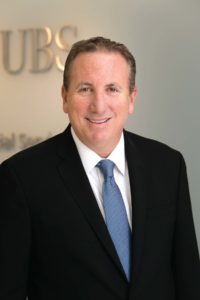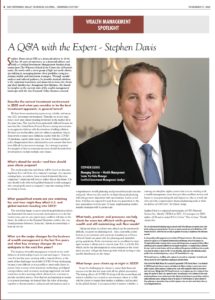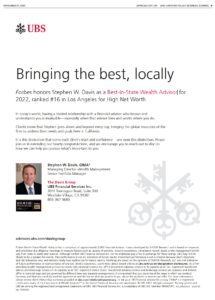
Stephen Davis joined UBS as a financial advisor in 2014. He has 30 years of experience as a financial advisor and holds a Certified Investment Management Analyst designation from The Wharton School of the University of Pennsylvania. He works with a select group of high net worth clients, specializing in managing private client portfolios using proprietary models and investment strategies. Through careful analysis and tailored guidance, he provides tactical solutions to the important transitions and financial decisions his clients and their families face throughout their lifetimes. He shared his insights on the current state of the wealth management landscape with the San Fernando Valley Business Journal.
Describe the current investment environment in 2022 and what you consider to be the best investment approach, in general terms?
We have been experiencing a precarious, volatile, and uncertain 2022 investment environment. Typically, we do not experience most asset classes trending downward in the market all at the same time. This year has been particularly difficult because we have had the United States Federal Reserve raising interest rates in an aggressive fashion with the intention of stifling inflation. We have not had headline and core inflation anywhere close to these levels in many years. Inflation coupled with the COVID-19 pandemic, supply chain issues, the war in Ukraine and fiscal policy disagreements have culminated in cross currents that have been difficult for investors to manage. As a strategy to protect the integrity of their investments investors should diversify their investments to include multiple asset classes.
What’s ahead for stocks—and how should your clients prepare?
The stock market has and always will be based on discounting future free cash flows of a company’s earnings. As corporate earnings have, as a whole, been revised downward this year, companies’ valuations will have to reflect this in the future. Clients should work with well qualified financial wealth managers who can properly assess a company’s corporate earnings before investing in them.
What geopolitical events are you watching for, and how might they affect U.S. and global markets heading into 2023?
The world has begun to move away from globalization which has dominated the macro-economic environment over the last twenty years, and we can expect more conflicts will arise in the future. In addition to the Russian/Ukrainian conflict, the continued pressures between China and Taiwan are something to keep an eye on.
What are the major changes for the business of wealth management in the last five years and what key strategy changes do you anticipate in the next five years?
The business of wealth management is based on the establishment of relationships based on trust and respect. However, over the last few years, working with a trusted advisor, as the result of the challenges faced with COVID-19 was challenging because it was difficult or not possible to meet with clients in person. Like so many other industries, technology, and digital correspondence such as remote meetings supplanted our traditional face-to-face meetings which allowed us to continue to provide excellent service. Now that we are beginning to return to in person meetings, we learned that the value of meeting together to discuss sensitive and personal information such as comprehensive wealth planning and personal financial concerns and goals. Moreover, the need for in depth financial planning will only get more important with uncertainties. Lastly, as trillions of dollars are expected to pass from one generation to the next generation over the next 20 years, implementing wealth transfer strategies will be paramount.
What tools, products and processes can help clients be more tax efficient while growing wealth and still maintaining cash flow needs?
Taking tax losses in a down year, which can be emotionally difficult, is a great tax planning tool. Also, charitable contributions to investments such as private foundations or Donor Advised Funds can assist with tax planning and charitable giving aspirations. Roth conversions can be excellent tax strategies because it allows you to convert your IRA to a Roth IRA, which can be tax advantageous in some scenarios as the retirement account will get the future growth without having to take taxable distributions in the future.
What keeps your clients up at night in 2022?
It may be challenging for clients to enjoy their financial success over the last few years with all the global uncertainty. The lasting effects of COVID-19 along with the recent financial market volatility has created an environment where it is difficult for clients to regain their market confidence and security in the global climate. I recommend that if market volatility is causing you sleepless nights, ensure that you are working with a wealth management team that provides excellent service and listens to your personal goals and objectives, who is is well suited to provide comprehensive financial planning such as what we deliver at UBS with The Davis Group.
Stephen Davis is a registered representative of UBS Financial Services Inc. Member FINRA an SIPC. He manages over $900 million AUM and is ranked #16 in Forbes’ “Best in State” Wealth Advisor list.
This is for informational and educational purposes only and should not be relied upon as investment advice or the basis for making any investment decisions. The views and opinions expressed may not be officially those of UBS Financial Services Inc. and the firm does not verify nor guarantee the accuracy or completeness of the information presented.
As a firm providing wealth management services to clients, UBS Financial Services Inc. offers investment advisory services in its capacity as an SEC-registered investment adviser and brokerage services in its capacity as an SEC-registered broker-dealer. Investment advisory services and brokerage services are separate and distinct, differ in material ways and are governed by different laws and separate arrangements. It is important that you understand the ways in which we conduct business, and that you carefully read the agreements and disclosures that we provide to you about the products or services we offer. For more information, please review client relationship summary provided at ubs.com/relationshipsummary, or ask your UBS Financial Advisor for a copy.
UBS Financial Services Inc., its affiliates and its employees do not provide tax or legal advice. You should consult with your personal tax and/or legal advisors regarding your particular situation.
Forbes Best-In-State Wealth Advisors list is comprised of approximately 5,000 financial advisors. It was developed by SHOOK Research and is based on in-person and telephone due diligence meetings to measure factors such as: quality of practice, industry experience, compliance record, assets under management (which vary from state to state) and revenue. Although neither UBS Financial Services Inc. nor its employees pay a fee in exchange for these ratings, UBS may hire RJ Shook to be a speaker for events. Past performance is not an indication of future results. Investment performance is not a criterion because client objectives and risk tolerances vary, and advisors rarely have audited performance reports. Rankings are based on the opinions of SHOOK Research, LLC and not indicative of future performance or representative of any one client’s experience. Learn more about award criteria at ubs.com/ us/en/designation-disclosures.

